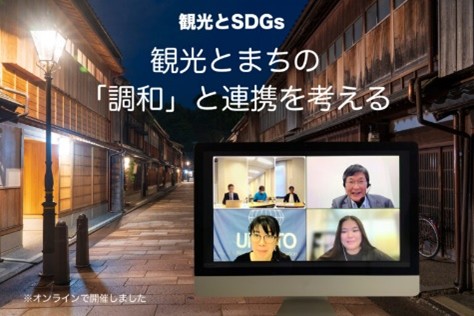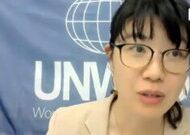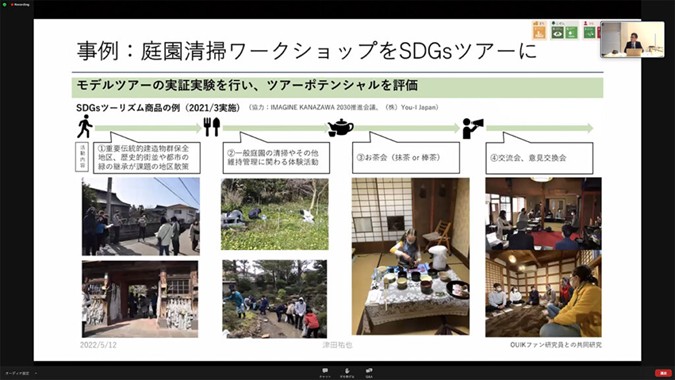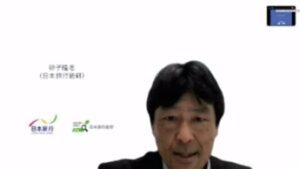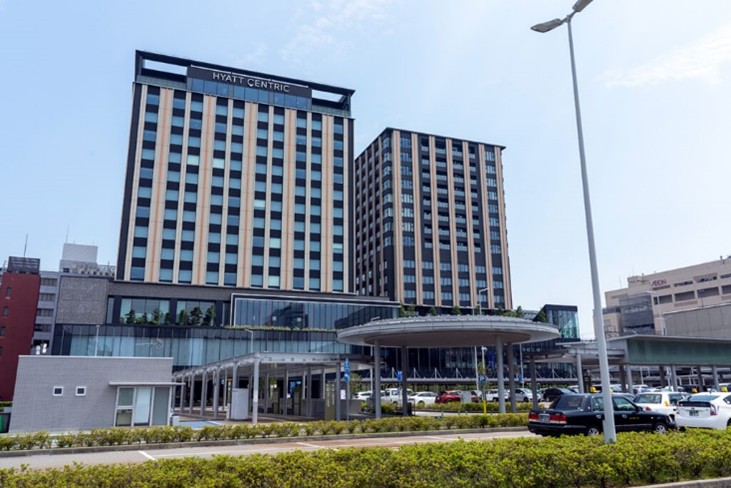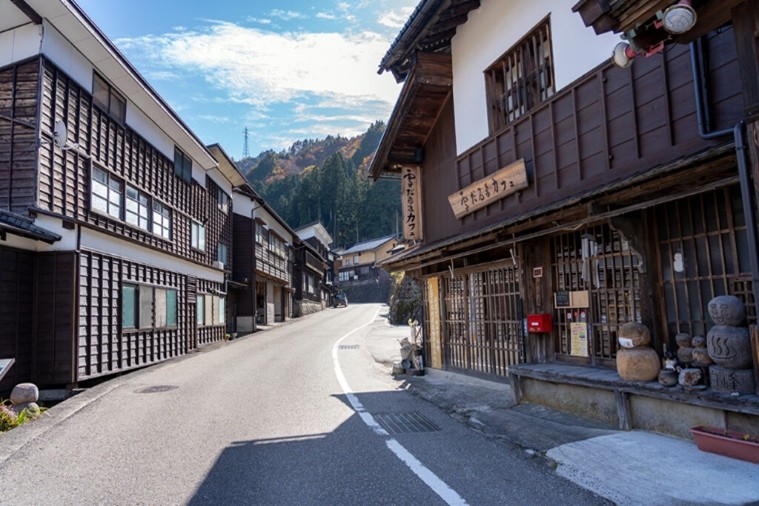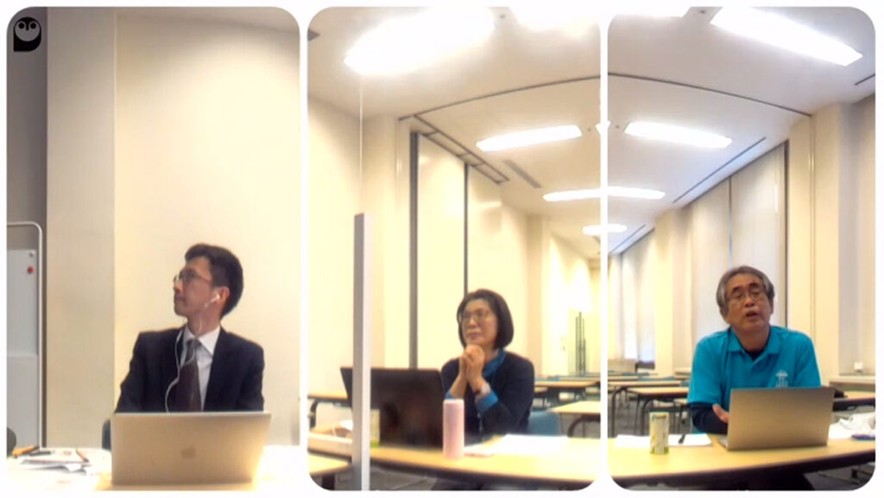Kanazawa City is dedicated to fostering sustainable tourism development that promotes “happiness” among both residents and visitors. This is achieved by building partnerships with various stakeholders and advocating for the Sustainable Development Goals (SDGs).
During the seminar, we explored how tourism can contribute to the realization of the SDGs and discussed the necessary actions to support this goal. Attendees were presented with global examples and shared experiences from individuals active in Ishikawa Prefecture, stimulating discussions about the future of tourism and urban development.
Global Case Studies in Sustainable Tourism
The seminar began with a lecture from Ms. Junko Yoshida of the UNWTO Office in Japan.
According to the UNWTO, the COVID-19 pandemic has shifted travelers’ perspectives, leading to an increased demand for sustainable tourism—experiences that embody the essence of local regions while having a beneficial impact.
Ms. Yoshida noted, “Younger generations are acutely aware of climate change issues and are driven by a strong sense of justice. If they choose travel destinations, it’s likely they will prefer areas committed to sustainable practices, including in Japan.”
She highlighted the Thompson Okanagan in Canada as a notable example, where seasonal fluctuations in tourism revenue have been addressed by establishing sustainability charters and educating both tourists and industry participants about responsible practices. Ms. Yoshida emphasized that fostering sustainable tourism requires collective effort from local communities as well as mutual understanding and cooperation from tourists.
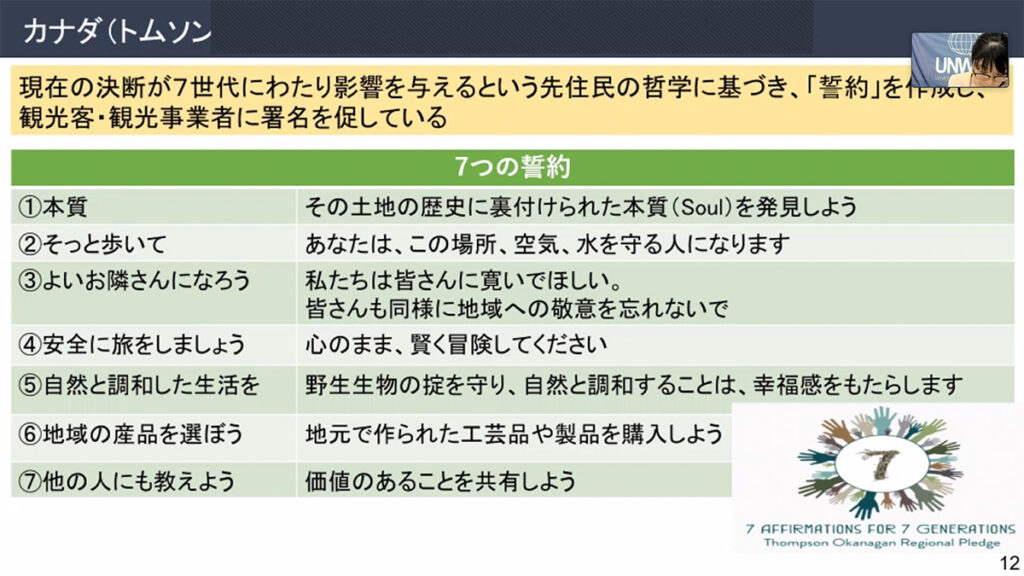
*The UNWTO (United Nations World Tourism Organization) is a UN agency focused on tourism and advocates for sustainable tourism practices. Publications on sustainable tourism are available in their E-library, with some resources translated into Japanese on the headquarters’ website in Japan.
Kanazawa’s Model for SDGs Tourism
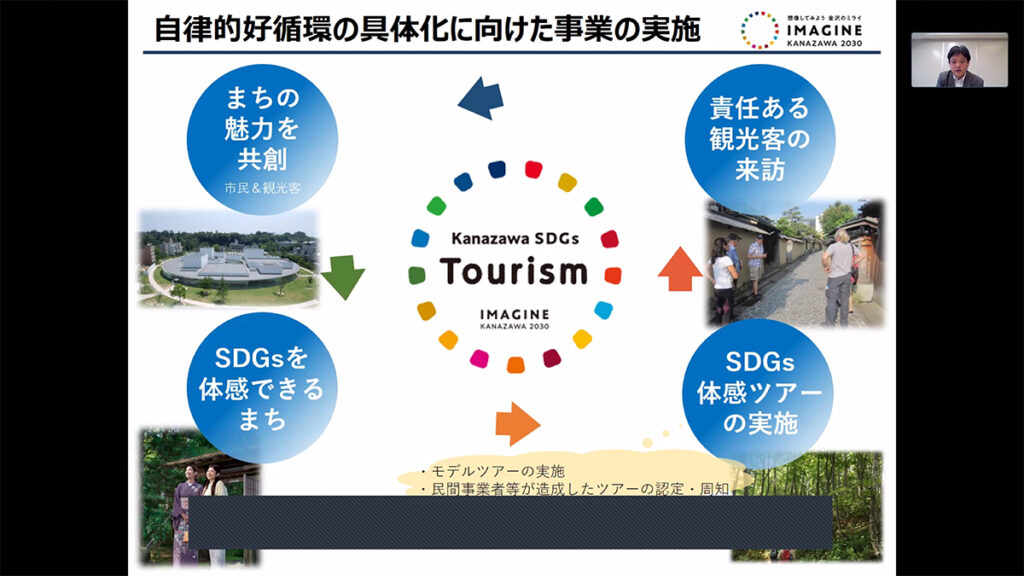
Mr. Kazushi Kunimoto from the IMAGINE KANAZAWA 2030 Promotion Council Secretariat shared insights on how the influx of tourists from the opening of the Hokuriku Shinkansen has affected daily life in Kanazawa and has led to both the consumption and transformation of local resources.
He stressed the need to enhance the city’s attractiveness in alignment with the SDGs and to promote it globally to attract “responsible tourists,” thereby ensuring happiness for both visitors and residents. This vision was part of Kanazawa City’s recognition as a Reiwa 2 SDGs Future City and inclusion in the Local Government SDGs Model Project.
“In the Local Government SDGs Model Project, we are developing ‘Kanazawa SDGs Tourism‘ to harmonize tourism with civic life and stimulate a circular regional economy. This approach aims to create a collective impact, achieve the SDGs, and serve as a catalyst for sustainable tourism,” Mr. Kunimoto explained
Over the last two years, 20 projects have been launched, including initiatives to promote leading practices in SDGs tourism and re-evaluate the elements of Kenrokuen from an SDGs perspective.
Yuya Tsuda, a Research Fellow at UNU-IAS OUIK, provided a lecture titled “Tourism and Partnerships,” showcasing a model tour focused on garden cleaning as part of tourism research conducted by UNU-IAS OUIK.
He emphasized the importance of gathering input from stakeholders, including local residents, visitors, and tourism operators, to develop collaborative rules and visions.
Panel Discussion on Urban Harmony and Sustainable Collaboration
The seminar featured a panel discussion featuring Takashi Sunako from Japan Travel / Japan Travel Research, Yoshikazu Takahashi from Hyatt Centric Kanazawa / Hyatt House Kanazawa, Akiko Koishi from TABITAIKEN Network, Takashi Yamaguchi from Shiramine Nature School / Shiramine Boarding School Executive Committee, and Kentaro Tada from Wakura Onsen Tada-ya, with Tsuda as the moderator.
Each speaker presented their ongoing initiatives to promote sustainable tourism.
Mr. Sunako stated, “Among new travel trends including SDGs, DX, and workations, we recognize SDGs as a crucial focus,” and discussed emerging travel products likely to gain traction.
He emphatically called for the sustainable promotion and accountability of tourism resources.
Mr. Takahashi from Hyatt Centric Kanazawa/Hyatt Centric Kanazawa highlighted that “harmony and coexistence with the city is a fundamental aspect of Hyatt’s philosophy,” referencing their participation in last year’s Kanazawa Rainbow Parade. He expressed hope that such initiatives would lead to greater awareness of diversity and inclusion, particularly regarding the LGBTQ+ community in Hokuriku, aiming to make Kanazawa a preferred destination.
Ms. Koshiishi spoke about her experiences leading Kanazawa SDGs tourism initiatives and as chief instructor at Ishikawa Nature School. She started the TABITAIKEN Net in 2018, which facilitates nature experiences for travelers, and introduced several interaction programs led by local nature guides.
Mr. Yamaguchi raised concerns regarding the population decline in Shiramine and how the tourism sector is facing challenges, not due to a lack of visitors, but rather due to a shortage of successors to sustain the industry. He suggested leveraging inconveniences, such as removing snow from roofs, into tourism opportunities to enhance local economies.
Mr. Tada from Tadaya shared that their management philosophy extends beyond just hospitality; it encompasses conveying the allure of the Noto region and being an integral part of the community. “We approach the SDGs not as a trend but as a necessary aspect of our commitment to a prosperous future,” Mr. Tada stated, emphasizing collaboration with other businesses to achieve gradual success.
During the panel discussion, some points emerged:
──What is Ms. Koshiishi’s focus in sustainable travel product development?
“We have developed an experience program centered on the theme of ‘Enhancing the Forest and Nature by Utilizing Forest Resources.’ We emphasize the scent of Kuro-Moji, a Japanese herb, to create a relaxing and refreshing experience. We have also received requests to offer this experience menu for delivery from our accommodation facilities.” (Ms. Koshiishi)
──It seems that Tadayama has created a creative menu consisting of just one type of dish with six courses. What effects does this have?
“This approach has helped reduce food leftovers and waste inventory, and it has significantly cut down on the amount of dishwashing. By limiting the variety of dishes, we can focus on using delicious, locally-sourced vegetables from small local farmers. This reduction in the number of dishes allows for more time to engage with customers, improving communication and enabling us to highlight the charm of the local area. It has also contributed to increased motivation among our staff.” (Mr. Tada)
──What are Ms. Sunako’s thoughts on communication with customers?
“While consumer numbers may still be low, it is undeniable that the number of customers who are conscious of SDGs and sustainable tourism is rapidly increasing. One thing to consider is how we reach out to customers. Beyond traditional mass media, those who have means to engage consumers, like travel agencies, should also be viewed as media. By approaching customers through these channels, I believe we can achieve better communication.” (Ms. Sunako)
Wrapping up the seminar, Tsunao Watanabe, Director of UNU-IAS OUIK, emphasized the significance of mutually supportive relationships between local communities and tourists, stating that both can be vital contributors to regional development.
Looking ahead, five additional seminars on sustainable tourism are planned for this year, covering various themes. We invite everyone to participate in future events.
Please see the video of the seminar below. ※Please note that the UNWTO presentations have been omitted due to presenter constraints


